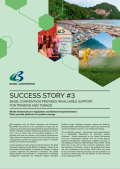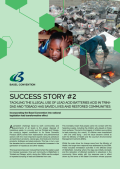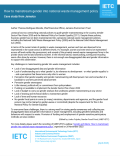This scoping study looks at the gender dimensions of all three Basel, Rotterdam and Stockholm (BRS) conventions as well as the Minamata Conventions in Bolivia. It examines chemicals of concern and identifies good practices, policies and initiatives addressing the gender dimension in the context of chemicals management. It also outlines key recommendations and actions on integration of gender into chemical management policies.
Taking the example of Lecos community, increased awareness among indigenous women about the consequences of gold mining for human health has led to a new initiative that provides insights for alternative income sources, including aquaculture, apiculture and agriculture. With support from the local municipality and aiming to not only protecting women but also economically empowering them, the efforts are strengthening the role of women within their community.
The target audience are the stakeholders from governmental institutions, agencies, science, and representatives of environmental and women organizations. This material is also helpful for those involved in the National Implementation Plan (NIP) review and update, in particular the task teams, gender consultants, gender focal points and practitioners.
Within the framework of the “Global Development, Review and Update of NIPs under the Stockholm Convention on POPs” project, the Green Growth Knowledge Partnership (GGKP) is executing Component 4, which focuses on the dissemination of information, management of knowledge and liaising with the Stockholm Convention Secretariat in providing information and tools to be integrated with existing materials and to make them easily accessible and understandable by all parties to the convention.



